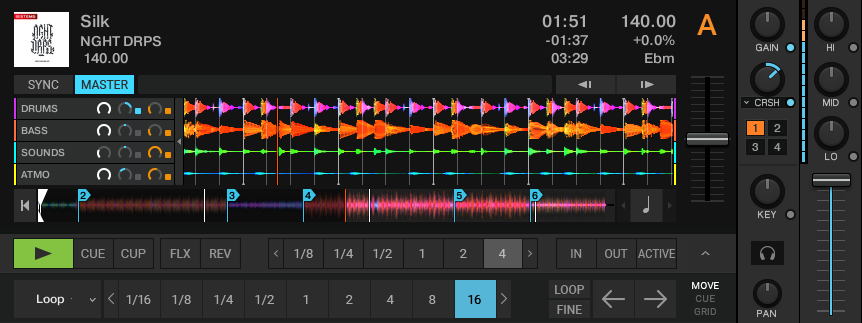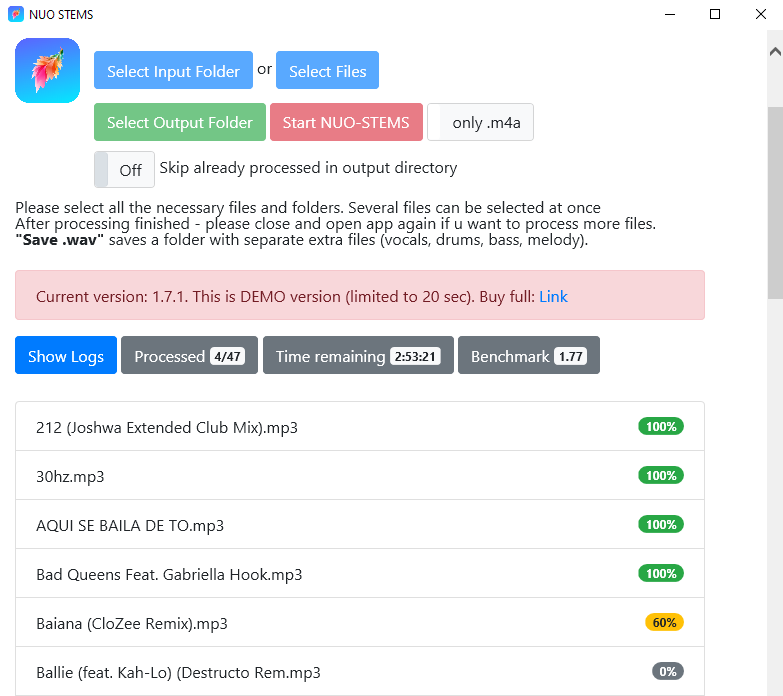In 2015, Native Instruments (NI) announced the release of Stems, an open-source file format which allowed producers to store up to four separate audio tracks in a single song container.
While compatible with any normal MP4 player, opening the song in a Stems-equipped software like Traktor allowed DJs to isolate individual song elements like bass lines and vocals while mixing, for more intricate transitions and mashups. Music distributions services like Beatport and Traxsource were quick to offer songs in the format on their site, and NI’s own free Stem Creator tool enabled producers to package their own tracks as Stems-compatible masters. Despite the ever-undefined holy grail of “live remix” DJing, though, a lack of adoption by many artists and labels, coupled with the need for DJs to re-purchase their music if they wished to use the song in Stems format and the initial requirement for owning NI-branded hardware to control the mixing, led to the concept being relegated to Traktor’s heap of underused features next to Remix Decks and Slicer Mode.

The recent advent of open-source AI and machine learning tools may well have finally culminated in a solution for NI’s dead file format. NUO-STEMS promises the ability to convert existing song libraries into Stems-compatible track files, utilizing the free audio-source separation tool Spleeter by Deezer. The utility analyzes the source file using the “Vocals/Drums/Bass/Other” source-separation model, outputting a converted song file ready to be loaded into Traktor and mixed like NI’s existing Stem tracks. The ability to use one’s existing library for this innovative mixing approach is certainly an enticing idea, and NUO-STEMS offers a full library conversion tool to make that happen with a few easy steps.

As with most automated solutions, however, the resulting output from NUO-STEMS is not always perfect, and occasionally unusable depending on the song. Certain tracks lend themselves well to the source-separation algorithm, resulting in well-defined drums and melodic lines. Others leave glaringly obvious audio artifacts and poor separation. Vocals and percussion elements with similar frequency content seem to suffer the most here, often jumbled and sounding like a bad MP3 recording.
But the utility, like the underlying machine-learning algorithms it incorporates, are still in the early years of their development, and are sure to improve over time. Despite NI’s false start, the goal of accessible live remixing is alive and well. Programs like djay Pro AI and the enduring Virtual DJ announced their proprietary version of a live stem separation last year, replacing the existing lo/mid/hi EQ paradigm with controls for Beats, Instruments, and Vocals; results are similarly hit or miss, but promising. And as the AI-based algorithms used by NUO-STEMS improve, the dream of show-ready backwards-compatible Stems mixing might finally catch up with NI.
NUO-STEMS is available here for $45 or a $5 per month subscription, with a limited free demo download.


